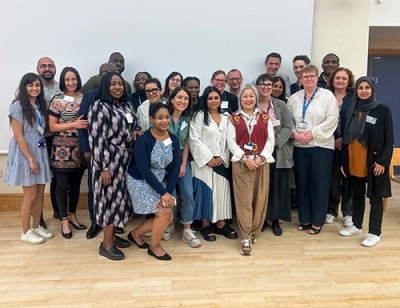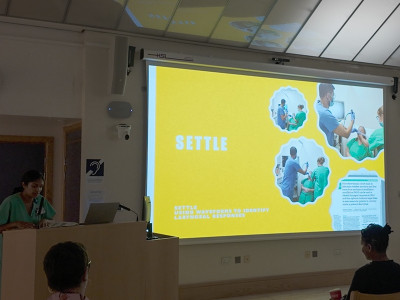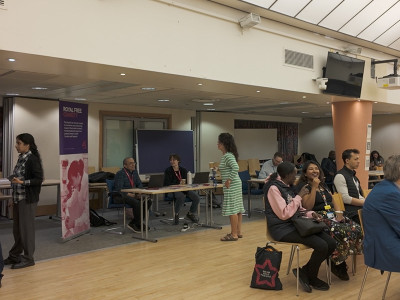
The day offered a unique opportunity to explore the role of research in delivering world-class care across the RFL. Attendees heard from expert speakers, explored pioneering projects, and took part in meaningful conversations about the future of inclusive and sustainable research.
Dr Gillian Smith, chief medical officer, opened the event by highlighting the vital role of research across the trust. She said: "Within the last year, as an organisation, we have launched a new clinical strategy. Part of that strategy is putting research at the forefront of everything that we do - our tripartite mission of excellence in research and education, as well as clinical care.”
She added: “There's been great progress in terms of our research and development strategy,” and emphasised the importance of collaboration with patients and carers, university partners, the Royal Free Charity, and the National Institute for Health and Care Research (NIHR).
The agenda featured talks from leading researchers and clinicians on topics ranging from respiratory innovation and personalised cancer treatment, to equitable access to research, collaboration in rare disease studies, and a panel discussion on patient and public involvement and engagement (PPIE) in research.
Research in action: key highlights from the day
Insights into collaboration on the SETTLE project with physiotherapist, Karthhika Jeyakumar explored how clinical teams are working closely with patients with neuromuscular conditions to co-develop more effective airway clearance treatments.

Professor John Hurst’s talk, driving innovation in respiratory research, underscored the scale of respiratory illness and the need for collaborative, research-led solutions to improve lung health. He highlighted that we take over 17,000 breaths a day, often not of clean air, making lung health one of the most pressing challenges in modern healthcare.
Dr Jane Kinghorn, director of the translational research office at UCL, emphasised the essential role of partnerships between academia, the RFL, and clinical teams in accelerating innovation. She described translational research as a "team sport" that navigates complex pathways to turn discoveries into patient care.
Dr Tamsin Callaghan, research involvement and inclusion manager at the RFL, highlighted that while researchers often collaborate among themselves, involving patients as active partners is crucial to ensure research addresses real patient needs and leads to meaningful improvements. During the PPIE panel, former patients, Sandra Selby and Katie Ingram shared personal experiences that highlighted why patient voices matter in shaping effective research.
Katie spoke about her journey from media to supporting maternal health research, emphasising the importance of patient involvement to fill gaps in women’s healthcare studies and to give back in a meaningful way.

Sandra described how participating in research panels opened her eyes to the complexities of clinical studies, the challenges of patient recruitment, and the importance of clear communication from a patient’s perspective. She values the chance to provide honest feedback that helps shape more patient-centred research.
Together, they underscored that patient collaboration brings fresh, vital perspectives that enhance the relevance and impact of research.
While the day began with engaging talks from leading researchers, the atrium came alive at lunchtime as research teams opened their stands, showcasing innovative studies and inviting staff and visitors to discover how they could get involved.

Katie Leigh-Ellis, senior research nurse, paediatric and adolescent clinical nurse specialist, spoke about the STAR initiative (Sickle Cell and Thalassaemia Alliance for Research), which brings together research nurses across north central London to boost patient access to clinical studies, especially for sickle cell and thalassaemia patients.
She highlighted the importance of making research more inclusive, gathering patient feedback, and increasing site activity to ensure meaningful engagement. Despite challenges like funding limitations and data system issues, Katie emphasised the team’s commitment to creative problem-solving, peer-reviewed collaboration, and sustained effort to make research more accessible and impactful.
Dr Robert Goldstein outlined the Target national trial, a UK-wide collaboration using simple blood tests to read the cancer DNA of patients with advanced disease and match them to targeted therapies. Early findings show that this approach can change diagnoses, reveal inherited risks, and open treatment options that standard tests miss, for truly personalised care.
Professor Ashutosh Wechalekar emphasised the critical need for collaborative research to improve amyloidosis diagnosis and treatment. The disease’s complexity, caused by unstable, misfolded proteins that form persistent fibres damaging multiple organs, results in common but misleading symptoms, leading to significant diagnostic delays.

Dr Clifford Lisk spoke about the CHARMER (CompreHensive geriAtRician led MEdication Review) study, involving 24 hospitals starting in 2024, and aimed to reduce the amount of unnecessary or inappropriate medications prescribed to older patients. The study focuses on improving medication reviews to lower harmful drug reactions and reduce hospital admissions. This work highlights the importance of collaboration between hospital teams, geriatricians, pharmacists, and researchers to improve prescribing practices and patient outcomes.
RFL group chief executive, Peter Landstrom and Dr Nnenna Osuji, chief executive of North Middlesex University Hospital, both spoke about the essential role of collaboration in driving research and innovation forward:
“What really unlocks progress in healthcare isn't just that lone genius, it's actually people working together to develop that thinking, to improve it, to translate it and then to deliver it as well. And so, the breakthroughs that we make don't happen in isolation. We know that they happen when we come together. And it's that spirit of collaboration that is so strong in the history here at the Royal Free London.”
– Peter Landstrom
“I know collaboration is a buzz word, but really, at its heart, it's about connection and collective activity. We need many people looking at different facets of the same problem for us to get to a solution.”
– Dr Nnenna Osuji
Aderonke Adebiyi, associate director of nursing, research, closed the event by highlighting the importance of partnership at every level: “Going forward, we can continue to collaborate and support, not just internally but also externally, and more importantly, with our patients as well.”
This was followed by a final opportunity for attendees to visit the stands, speak with research teams, and discover how they could take part in ongoing studies.
The event reflected the RFL’s ongoing commitment to ethical, inclusive, and impactful research and served as a powerful reminder that research is for everyone.
If you’d like to find out more or get involved in research, please contact rf-tr.
 Translate
Translate